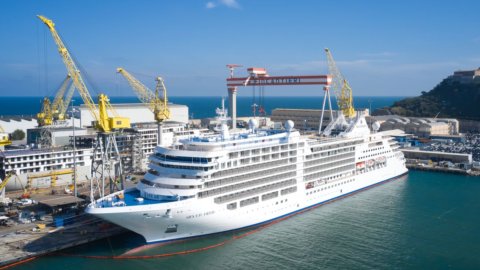The European shipyard champion will not be born. A few days before the deadline set by the European Antitrust (January 31st), the die has already been cast: the agreement between the Italian shipowner Fincantieri and the historic French group Chantiers de l'Atlantique no longer has any reason to exist. Officially, to put an end to the telenovela started now in 2016, when the Korean group Stx came out of Saint Nazaire (then the long negotiation with Fincantieri and the agreement reached in 2018, the year from which it is subjected to examination by Brussels), it will be Covid and the crisis triggered by it, especially in the tourism and cruise sector. Many will recall that the onset of the pandemic is also associated with the case of the Diamond Princess, with its 3.600 quarantined passengers off Japan, about a year ago. Then for months the sector was at a standstill, restarting only in August 2020 but amidst a thousand difficulties.
This is why, from an industrial point of view, the deal that would have seen Fincantieri acquire 50+1% of Chantiers de l'Atlantique, with the 1% which assigned the absolute majority "on loan" from the French state (which today holds 84,3% of the group), makes less sense than some time ago, when the sector was booming. And it is for this reason that the military naval joint venture remains absolutely standing, through Naviris. However, behind the flop of one of the most anticipated weddings of recent years, which would have seen for once a "predatory" and not "preyed" Italian group, there is also much more. Meanwhile, the obstacle of the European Antitrust: the Fincantieri-Saint Nazaire merger would indeed have created a giant capable of competing internationally, especially in the presence of China which is also beginning to dominate this market, but at the same time it would have reduced competition within the continent from three to two major groups.
The players would therefore have been the nascent Italian-French group and then the sole German shipowner Meyer Werft. This is why the EU Commissioner for Competition, the Danish Margrethe Vestager, has repeatedly asked Fincantieri for further documentation to avoid the risk of duopoly: the verdict was initially expected even in 2019, then it dragged on until the deadline of last December 31, extended by a further month which however - barring surprises - was not enough to settle the matter. This question is in fact already closed, also for the political reasons that immediately accompanied the operation. France, even under the "European" presidency of Emmanuel Macron, has confirmed that it is a country that prefers not to give up its national champions, even more so if - as happens regularly - it is the state that holds control, often with very large stakes. high as in the case of Saint Nazaire.
The agreement with "les italiens" had been found with difficulty, but only recently the French Economy Minister, Bruno Le Maire, he was keen to reiterate that Paris "does not want to cede control of the large national groups, but is willing to welcome foreign investors". A bit like he would have liked to do with Fincantieri: the merger was good, but with a still massive presence of the French state in the capital, and the retention of the entire workforce (the employees of Chantiers de l'Atlantique own 2,4% of capital). Even the Senate Economic Affairs Committee turned up its nose, repeatedly underlining the risks for "industrial sovereignty" and the fear of seeing technological know-how lost, since in the meantime the promised partner from Trieste had also become a partner of the Chinese China State Shipbuilding Corporation (CSSC). In the quoted speech, the minister referred to another recent case, which gives an idea of the transalpine modus operandi.
A few weeks ago the giant of large-scale distribution Carrefour was about to end up in the hands of the Canadian group Couche-Tard: operation immediately blocked by the French government, among other things with the approval of all political parties, including the opposition. To such an extent that while Macron spoke of a "forced choice" and many saw in this move the admirable desire to defend the work of supermarket employees, among the "heroes" of Covid, an authoritative newspaper such as Le Monde questioned the excessively protectionist image that France is giving of itself. On the Italian side (the State holds 71% of Fincantieri through CDP), in this moment of political crisis and with a Recovery Plan on the high seas, there is little will to keep the point and go to confrontation with French colleagues and/or with Brussels. For all these reasons, he will miss the conquest of the Loire shipyards.





